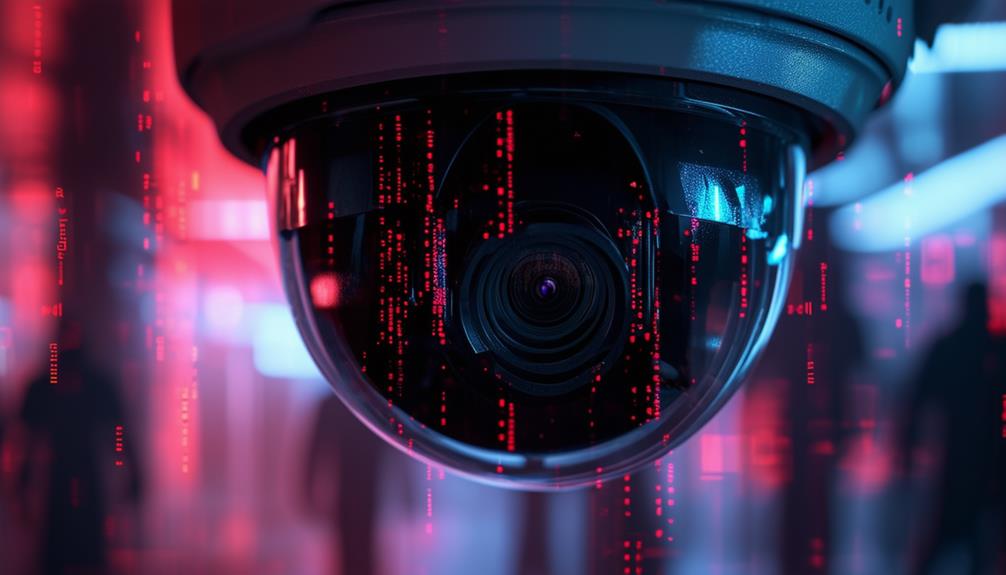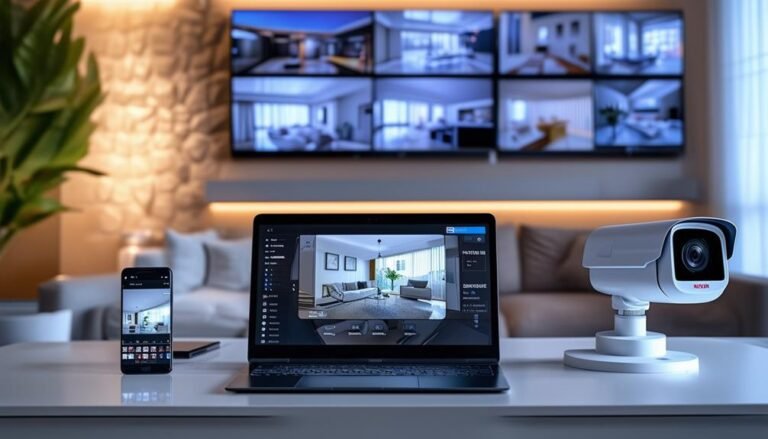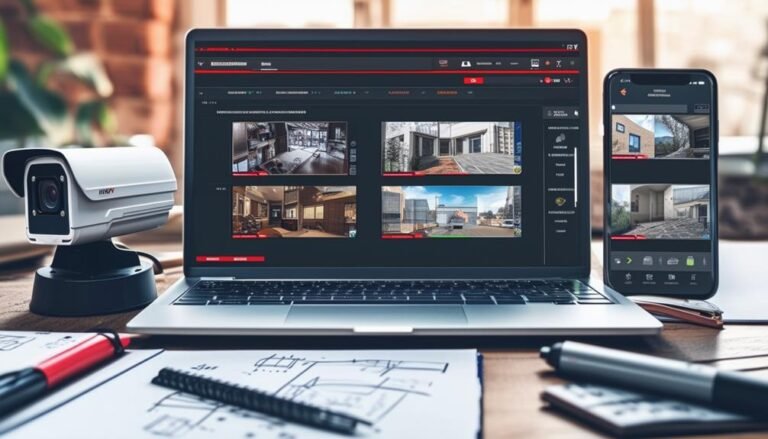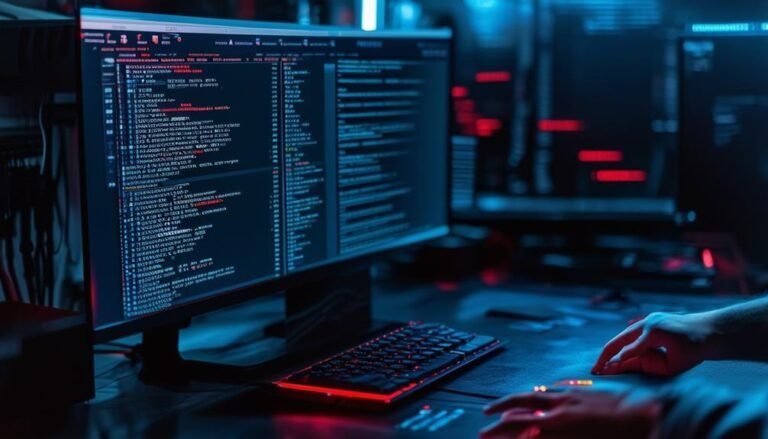Yes, Hikvision cameras can be hacked. This is largely due to common vulnerabilities like default passwords, outdated firmware, and unsecured networks. Notable incidents have shown unauthorized access to live feeds, posing serious risks to privacy and security. Hackers can manipulate camera controls and even surveil sensitive areas, compromising your safety. To guard against these threats, it's crucial to change default passwords, update firmware regularly, and secure your network settings. Implementing these measures can greatly enhance your security. If you're curious about more protective strategies and future developments, there's plenty more to explore.
Overview of Hikvision Cameras
Hikvision cameras are a popular choice for surveillance, offering a range of models designed for both residential and commercial use. These cameras cater to diverse needs, whether you're looking to monitor your home, office, or a larger business environment. Their variety includes options like dome cameras, bullet cameras, and PTZ (pan-tilt-zoom) models, allowing you to pick the one that best aligns with your specific security requirements.
What sets Hikvision apart is their commitment to delivering high-quality video footage. Many models come equipped with features such as night vision, motion detection, and advanced analytics. These capabilities empower you to monitor your surroundings effectively, giving you peace of mind and a sense of control over your security.
Moreover, Hikvision cameras often integrate seamlessly with existing security systems, making it easier for you to enhance your current setup or start from scratch. With user-friendly interfaces and mobile apps, you can access live feeds and recordings from anywhere, ensuring you're always in the loop.
In this age of technology, having the ability to monitor your property remotely can be liberating. You can check in on your surroundings while you're away, providing reassurance and a feeling of safety. Whether you're a homeowner wanting to protect your space or a business owner looking to secure your assets, Hikvision cameras offer the flexibility and features needed to help you maintain your freedom and independence in a world where security is paramount.
Common Vulnerabilities in Security Cameras
When it comes to security cameras, you might not realize how common vulnerabilities can put your privacy at risk. Issues like default passwords, outdated firmware, and unsecured network connections can leave your devices wide open to hacking. Understanding these vulnerabilities is essential for keeping your surveillance systems safe.
Default Password Issues
Default passwords are a vital vulnerability in security cameras, leaving systems exposed to unauthorized access. Many users neglect to change these factory-set passwords, often thinking they're safe. This mindset can be dangerous. When a hacker knows the default credentials, they can easily breach your camera's security, putting your privacy at risk.
Imagine someone gaining access to your security feeds, watching your every move. It's not just about your home; it's about your freedom to feel secure within your own space. By not changing default passwords, you're granting unwarranted access to anyone with malicious intent.
It's essential to take control of your security devices. Start by changing those default passwords immediately after installation. Use unique, complex passwords that combine letters, numbers, and symbols. This simple step can greatly bolster your defenses against unauthorized intrusions.
Outdated Firmware Risks
Outdated firmware poses a significant threat to the security of your cameras, making them vulnerable to cyberattacks. When manufacturers release updates, they often patch critical vulnerabilities that could be exploited by hackers. If you neglect these updates, you're leaving your cameras open to potential breaches, compromising your safety and privacy.
Here are some common vulnerabilities associated with outdated firmware:
- Security Flaws: Old firmware may have known exploits, making it easy for attackers to gain access.
- Malware Insertion: Hackers can inject malware, turning your camera into a surveillance tool for them.
- Loss of Functionality: Outdated software can lead to system failures, causing your cameras to malfunction when you need them most.
- Incompatibility: Newer security features may not work, leaving you exposed to risks that updated systems can mitigate.
Unsecured Network Connections
Unsecured network connections can create a gaping hole in the security of your cameras, making them easy targets for cybercriminals. If your cameras are linked to an open Wi-Fi network or lack proper encryption, hackers can easily intercept the data being transmitted. This vulnerability can lead to unauthorized access, allowing them to view your footage or even take control of your devices.
When you think about your freedom and privacy, securing your network should be a top priority. Use strong, unique passwords and enable WPA3 encryption on your wireless network. Avoid default settings that come with your cameras, as they often leave you exposed.
It's also wise to segment your security cameras from your main network. By creating a separate network for your cameras, you can reduce the risk of a breach affecting your other connected devices.
Notable Hacking Incidents
Hacking incidents involving surveillance cameras have raised significant concerns about security vulnerabilities in modern technology. You can't ignore the implications these breaches have on privacy and safety. Remarkably, Hikvision cameras have been targets of several high-profile hacking incidents that highlight just how real these threats are.
For instance, in 2017, a group of researchers demonstrated the ability to access Hikvision cameras remotely, exposing flaws in the system's firmware. This incident shook many, revealing how exposed your surveillance systems could be. Similarly, in 2019, hackers managed to infiltrate numerous cameras worldwide, gaining access to live feeds and recorded footage. They used easily accessible tools that anyone with a little tech knowledge could employ.
Here are some significant incidents that grabbed headlines:
- A breach that exposed thousands of cameras at a major university, compromising student safety.
- Unauthorized access to security feeds from a prominent retail chain, highlighting vulnerabilities in corporate systems.
- An incident where hackers livestreamed footage from unsecured cameras in private homes, violating personal privacy.
- A ransom attack on a city's surveillance network, demonstrating the potential for extortion.
These incidents serve as stark reminders of the risks involved with surveillance technology. As you consider your own security measures, it's essential to realize that being proactive about vulnerabilities can mean the difference between safety and exposure. Awareness is the first step toward freedom from unwanted intrusions.
Risks of Hacked Cameras
When your Hikvision cameras get hacked, you open the door to serious risks. Unauthorized access can lead to unwanted surveillance, while your personal data might be compromised. Plus, hackers could manipulate your devices, giving them control over your security system.
Unauthorized Surveillance Access
Millions of surveillance cameras around the world are vulnerable to unauthorized access, posing significant risks to privacy and security. When these cameras are hacked, it's not just the technology that's at stake; your personal freedom can be compromised as well. Imagine someone watching your every move, taking away the sense of safety in your own space.
Here are some potential risks of unauthorized surveillance access:
- Invasion of privacy: Your daily activities could be monitored without your consent.
- Stalking and harassment: Hackers could use your camera to track and intimidate you.
- Data manipulation: Hackers could tamper with footage, altering reality to serve their agenda.
- Public exposure: Sensitive moments captured could be shared online, leading to embarrassment or worse.
Knowing these risks, it's essential to take preventive measures. Verify your cameras have strong passwords and keep the firmware updated. You deserve to feel secure in your own environment, free from the prying eyes of unauthorized watchers. Protecting your privacy isn't just about technology; it's about safeguarding your freedom. Stay vigilant and informed to verify your surveillance systems serve you, not the other way around.
Data Privacy Violations
Data privacy violations can occur at an alarming rate when surveillance cameras are compromised. Imagine someone gaining unauthorized access to your camera feeds, watching your daily activities, and invading your personal space. This isn't just a theoretical risk; it's a real threat to your privacy. Once hackers infiltrate a camera system, they can collect sensitive information, potentially exposing your home life, habits, and routines.
You might think your data's safe, but that's often an illusion. The reality is, if your Hikvision camera gets hacked, personal moments captured by your surveillance may end up in the hands of malicious actors. They could use this information to manipulate or blackmail you, turning your desire for security into a vulnerability.
The implications extend beyond just you, too. If a hacker gains access to multiple cameras, they can create a detailed profile of an entire neighborhood, compromising the privacy of many. In a world where freedom and personal space are paramount, these violations threaten the very essence of what it means to feel secure in your own home. It's essential to take steps to safeguard your surveillance system to protect your privacy and maintain your freedom.
Device Control Manipulation
Unauthorized access to your Hikvision cameras doesn't just threaten your privacy; it also opens the door to device control manipulation. Imagine someone gaining the ability to control your cameras, which can lead to chaos and serious safety concerns. When hackers get in, they can do all sorts of things that undermine your sense of security.
- Change camera angles to surveil sensitive areas
- Disable recording features, erasing critical footage
- Stream live feeds to unauthorized viewers
- Use your cameras as a gateway to infiltrate other devices
This manipulation can leave you feeling vulnerable in your own home. You trust these devices to keep you safe, but when they're compromised, that trust is shattered. The risk isn't just about losing control; it's about the potential for misuse that can disrupt your life. It's crucial to stay aware of these dangers and take proactive steps to secure your cameras. Regularly update firmware, strengthen passwords, and monitor access logs. By doing so, you reclaim your freedom from the threat of hacking and guarantee that your surveillance system remains in your control.
Best Practices for Protection
Protecting your Hikvision cameras from potential hacks is vital for maintaining security and peace of mind. By following these best practices, you can greatly reduce the risk of unauthorized access and guarantee your surveillance system remains a reliable guardian of your freedom.
| Action | Purpose | Impact |
|---|---|---|
| Change Default Password | Prevent unauthorized access | Enhances security |
| Update Firmware Regularly | Fix vulnerabilities | Keeps your system current |
| Secure Network Settings | Protect data transmission | Saves your privacy |
| Monitor Camera Activity | Detect unusual behavior | Guarantees peace of mind |
Changing the default password is your first line of defense. Make it strong and unique—something that can't be easily guessed. Regularly updating your firmware is just as important; it helps fix bugs and security holes that hackers could exploit.
In addition, securing your network settings can create a barrier between your cameras and potential intruders. This includes using a Virtual Private Network (VPN) or enabling firewalls.
Lastly, actively monitoring your camera activity can alert you to any unusual behavior, giving you the chance to act quickly.
Future of Hikvision Security
As we look ahead, the future of Hikvision security promises to be shaped by advancements in technology and evolving user needs. You'll see a shift towards smarter, more intuitive systems that prioritize your freedom and privacy. Here's what you can expect:
- Enhanced AI Capabilities: Expect cameras equipped with AI to analyze footage in real-time, providing alerts for unusual activities without compromising your personal space.
- Increased Integration: Future systems will likely integrate seamlessly with other smart home devices, giving you more control and flexibility over your security setup.
- Robust Encryption: To counteract hacking threats, Hikvision will probably enhance encryption methods, ensuring your data remains secure and private.
- User-Centric Design: As user needs evolve, expect a focus on user-friendly interfaces that empower you to customize your security features easily.
You won't just be a passive observer; you'll actively engage with your security system, tailoring it to fit your lifestyle. The goal is to create a sense of safety without infringing on your freedom. As technology progresses, Hikvision will adapt to these changes, working to balance security and user autonomy. In doing so, they'll not only meet the demands of today but also anticipate the needs of tomorrow. You can look forward to a future where your security is as dynamic and adaptable as you are.
Frequently Asked Questions
Are Hikvision Cameras Safe for Home Use?
When considering if Hikvision cameras are safe for home use, it's essential to understand their security features and any potential vulnerabilities. While these cameras offer great surveillance capabilities, you should stay informed about firmware updates and network security to protect your privacy. It's also wise to explore alternative brands if you're concerned about data security. Ultimately, your comfort level with technology and privacy risks will guide your decision.
How Can I Tell if My Hikvision Camera Is Hacked?
You'd think your Hikvision camera's just a harmless eye in the sky, right? But if it suddenly starts acting weird—like sending you notifications at odd hours or showing footage you didn't record—it might be time to worry. Check for unusual login attempts in your settings, and verify your firmware's up to date. If your camera's gone rogue, it's time to take back your privacy and secure your digital space.
What Features Make Hikvision Cameras Vulnerable to Hacking?
Hikvision cameras can be vulnerable due to several factors. Weak default passwords are common, making it easy for hackers to gain access. Outdated firmware can also leave your device exposed to known exploits. If you haven't changed your settings or updated the software, you might be at risk. Additionally, unsecured networks can give intruders an easy entry point. To protect your privacy, stay proactive about security measures and regularly check for updates.
Can I Improve My Hikvision Camera's Security Settings?
Improving your Hikvision camera's security settings is like fortifying your castle against invaders. You can start by changing the default password to a strong, unique one—think of it as a sturdy lock on your door. Keep the firmware updated, as it's your camera's armor against vulnerabilities. Disable unnecessary features and enable encryption for added safety. By taking these steps, you're embracing your freedom to secure your space, keeping prying eyes at bay.
Do Hikvision Cameras Have Built-In Anti-Hacking Measures?
Hikvision cameras come with some built-in security features aimed at protecting against unauthorized access. However, relying solely on these measures isn't enough. You should always implement additional security practices, like changing default passwords and regularly updating firmware. By being proactive, you can enhance your camera's defenses. Remember, the more you invest in securing your system, the less vulnerable it'll be to potential threats, allowing you to enjoy peace of mind.



